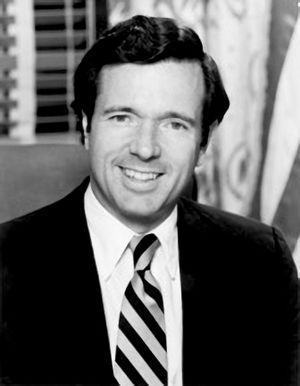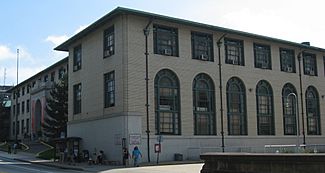John Heinz facts for kids
Quick facts for kids
John Heinz
|
|
|---|---|
 |
|
| United States Senator from Pennsylvania |
|
| In office January 3, 1977 – April 4, 1991 |
|
| Preceded by | Hugh Scott |
| Succeeded by | Harris Wofford |
| Member of the U.S. House of Representatives from Pennsylvania's 18th district |
|
| In office November 2, 1971 – January 3, 1977 |
|
| Preceded by | Robert Corbett |
| Succeeded by | Doug Walgren |
| Personal details | |
| Born |
Henry John Heinz III
October 23, 1938 Pittsburgh, Pennsylvania, U.S. |
| Died | April 4, 1991 (aged 52) Lower Merion Township, Pennsylvania, U.S. |
| Cause of death | Plane crash |
| Resting place | Homewood Cemetery |
| Political party | Republican |
| Spouse | |
| Children | 3, including André and Christopher |
| Parent |
|
| Relatives | Henry J. Heinz (great-grandfather) Drue English (stepmother) |
| Alma mater | Yale University Harvard Business School |
| Military service | |
| Allegiance | |
| Branch/service | |
| Years of service | 1963–1969 |
Henry John Heinz III (born October 23, 1938 – died April 4, 1991) was an American businessman and politician. He served as a U.S. Senator for Pennsylvania from 1977 until he died in 1991. Before that, Heinz was a U.S. Representative for Pennsylvania's 18th congressional district from 1971 to 1977.
Contents
Early life and education
Henry John Heinz III was born in Pittsburgh, Pennsylvania, on October 23, 1938. He was the only child of Joan (Diehl) and H. J. "Jack" Heinz II. His father was the heir to the famous H. J. Heinz Company. His parents divorced in 1942.
Heinz moved to San Francisco, California, with his mother and stepfather. Even though he lived mostly in San Francisco, he spent summers with his father in Pittsburgh.
In 1956, Heinz graduated from Phillips Exeter Academy. He then went to Yale University, where he studied history, arts, and letters, graduating in 1960. He later earned another degree from Harvard Business School in 1963. During a summer break from Harvard, he met his future wife, Teresa Simões Ferreira.
After finishing Harvard Business School in 1963, Heinz joined the United States Air Force Reserve. He was on active duty that same year and stayed in the Air Force Reserve until 1969.
Before becoming a politician, Heinz worked as an assistant to Pennsylvania's Republican U.S. Senator Hugh Scott. He also helped manage Scott's re-election campaign. From 1965 to 1970, Heinz worked in the financial and marketing parts of the H. J. Heinz Company. After that, he became a business professor at Carnegie Mellon University.
Political career
Serving in the U.S. House of Representatives
In 1971, Heinz began his political career. The U.S. Representative for Pennsylvania's 18th congressional district, Robert Corbett, passed away. Heinz won the special election on November 2, 1971, to take his place. He was re-elected to the U.S. House of Representatives in 1972 and 1974.
Serving in the U.S. Senate
Instead of running for the House again, Heinz decided to run for Pennsylvania's open United States Senate seat in 1976. The current Senator, Hugh Scott, was retiring. Heinz won that election. He was re-elected two more times, in 1982 and 1988.
In the Senate, Heinz was known as a moderate-to-liberal Republican. This means he often held views that were in the middle or leaned a bit more liberal than some other Republicans. He was part of important groups like the Committee on Banking, Housing, and Urban Affairs, and the Committee on Finance. He also led the Special Committee on Aging.
Heinz supported the bill to make Martin Luther King Jr. Day a federal holiday. He also voted to support the Civil Rights Restoration Act of 1987.
He was chosen to be the chairman of the National Republican Senatorial Committee twice, from 1979–1981 and 1985–1987.
The New York Times newspaper said that Heinz was a strong supporter of older people and the steel industry. He helped pass laws that made the Social Security system financially stronger. He also played a big part in improving laws about retirement plans, health insurance, and nursing homes. He worked to create trade laws that helped American products, like steel, compete better with foreign goods.
Death
On April 4, 1991, Senator Heinz died in a plane crash. Six other people, including two children, also died. A helicopter and Heinz's plane crashed in the air above Merion Elementary School in Lower Merion Township, Pennsylvania. The helicopter was checking on a problem with Heinz's plane's landing gear when they collided. Both aircraft lost control and crashed. The investigation found that the crash was caused by the pilots making poor decisions.
After his death, a funeral was held at Heinz Memorial Chapel in Pittsburgh. A memorial service in Washington, D.C., was attended by President George H. W. Bush. Senator Heinz was buried in the Heinz family mausoleum at Homewood Cemetery in Pittsburgh.
His friend, Senator Tim Wirth, said that Heinz truly believed he could make the world a better place. Heinz's son, André, shared at the service, "Dad, I am so grateful for the time we had, and I miss you and I love you."
In 1995, Teresa, Heinz's widow, married John Kerry. He was also a Senator and later became the Secretary of State.
Legacy

After his death, the Tinicum Wildlife Preserve was renamed the John Heinz National Wildlife Refuge at Tinicum to honor him. This refuge is a large natural area with a freshwater marsh, home to many plants and animals.
In 1993, his family created the Heinz Awards. These awards celebrate people who show great innovation in five different areas. One of the Jefferson Awards for Public Service is also named in his honor. It recognizes great public service by an elected or appointed official.
Several places and institutions are named after him, including:
- The Senator H. John Heinz III Archives at the Carnegie Mellon University Libraries
- The H. John Heinz III College at Carnegie Mellon University
- The H. John Heinz III Center for Science, Economics and the Environment
- The Senator John Heinz History Center
- The H. J. Heinz Campus of the VA Pittsburgh Healthcare System
See also
- List of United States Congress members who died in office (1950–99)
 | James Van Der Zee |
 | Alma Thomas |
 | Ellis Wilson |
 | Margaret Taylor-Burroughs |

